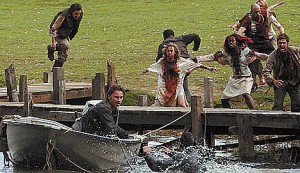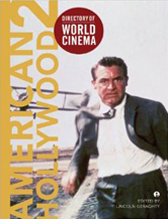
REVIEW: 28 Weeks Later
Every so often a sequel comes out of Hollywood that successfully challenges audience expectations; breaking a generic mould, or fleeing the formulaic cage of a worn out franchise. Sadly, 28 Weeks Later is no such film.
That’s not to say the film doesn’t at least attempt such transgressions. The opening sequence in particular is marked by a series of clever narrative twists. A seemingly romantic candlelit dinner between two characters is suddenly interrupted by the presence of other guests. A potentially deadly intruder is revealed as a dishevelled child. The setting, which initially seems shrouded in a post-apocalyptic darkness, belies brightly lit, beautifully green cottage surroundings. A heroic escape brings with it an unthinkably selfish act of survival.
So it was that less than 10 minutes into 28 Weeks Later I was happily preparing myself for another interesting addition to such recent ‘zombie-styled’ narratives as Zack Snyder’s remake of Dawn of the Dead, Edgar Wright’s Shaun of the Dead, and George Romero’s vastly underrated Land of the Dead. Twenty-eight minutes later, I was wondering how it all could’ve gone so horribly wrong.
 In what must surely have seemed like a radical gesture on paper, director Juan Carlos Fresnadillo (who previously helmed the enigmatic Intacto) and the three other writers who contributed to the final script, decide to ‘infect’ the lead character barely half way through the narrative. While ‘genre-bending’ in one sense, the manoeuvre is entirely ill considered in terms of the overall structure of the film. Leaving no other empathetic character to ‘pick up the slack’ the decision proves fatal in terms of the audience’s engagement with the narrative. As soon as the protagonist joins the ranks of the bloodthirsty mass, there’s really no one else to care about and 28 Weeks Later implodes in a vacuum of tiresome chase sequences and entirely predictable resolutions.
In what must surely have seemed like a radical gesture on paper, director Juan Carlos Fresnadillo (who previously helmed the enigmatic Intacto) and the three other writers who contributed to the final script, decide to ‘infect’ the lead character barely half way through the narrative. While ‘genre-bending’ in one sense, the manoeuvre is entirely ill considered in terms of the overall structure of the film. Leaving no other empathetic character to ‘pick up the slack’ the decision proves fatal in terms of the audience’s engagement with the narrative. As soon as the protagonist joins the ranks of the bloodthirsty mass, there’s really no one else to care about and 28 Weeks Later implodes in a vacuum of tiresome chase sequences and entirely predictable resolutions.
It’s not that film didn’t have the potential for something more, it’s just that none of the interesting narrative arcs are sustained for more than a few fleeting moments. There was the possibility for an interesting exploration of the family unit, American military intervention, or even genetic testing, but none of these registers more than a footnote of importance to the overall plot. The presence of so many writers for the screenplay leads me to suspect that at one time 28 Weeks Later may have been concerned with each of these threads, but as they appear here, amalgamated into one, it simply doesn’t work.
As the plot falls apart, and the Rage infected masses spread once more throughout the greater London area, the logic of the film falls into a complete state of disrepair. Are we really expected to believe that two children could so easily escape a military quarantine zone under the noses of US occupiers? Why is the military’s first response to the break out of infection a napalm-styled fire bombing raid that destroys the entire ‘safe zone’, buildings and all, when later a zombie ‘insecticide’ proves much more useful and less destructive?
Both Robert Carlyle and Catherine McCormack are entirely wasted in their roles here, while the script prevents Rose Byrne from proving herself as a military medical officer attempting to curb the spread of the virus. The only aspects in which the film succeeds are those it takes from its predecessor: the haunting shots of deserted London streets, and the score’s central musical refrain. Perhaps, by the time 28 Months Later rolls by they’ll have come up with a narrative whose deviations provide a foundation for a generic triumph, not a self-annihilation.





RSS feed for comments on this post. TrackBack URI